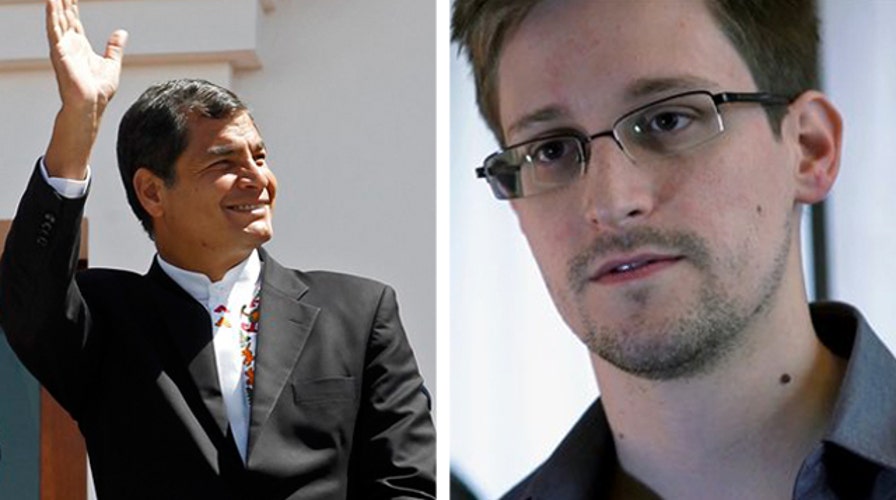Tensions flared Thursday between the Obama administration and countries that appear to be helping NSA leaker Edward Snowden, with the State Department pointedly warning a defiant Ecuador there will be "grave consequences" if the foreign government grants Snowden asylum.
State Department spokesman Patrick Ventrell also ripped Hong Kong officials for trying to claim a day earlier that a misspelled middle name on Snowden's paperwork contributed to him being allowed to catch a flight from Hong Kong to Moscow over the weekend.
"They knew he was a wanted fugitive, and they intentionally let him go," Ventrell said, calling their excuse frivolous. "They've tried to sort of say, oops, he just left. And we're saying, no, that this was an intentional decision."
The dueling statements escalated the already-tense stand-off involving several countries now.
The Obama administration has warned that Hong Kong's decision to let Snowden go could hurt U.S.-China relations. U.S. officials, to little avail, are still trying to convince the Russian government to expel Snowden to the United States -- Snowden is believed to be hunkered down in the Moscow airport, but Russian officials claim he is not their problem.
But attention focused Thursday on Ecuador, as officials there telegraphed the message that the South American government did not need or want U.S. aid and assistance.
According to Reuters, Ecuador said it was waiving favorable trade rights under a trade agreement with the U.S. In a dig at Washington, officials there also offered the U.S. $23 million in aid for "education about human rights."
The moves were a signal that Ecuador was not considering its own U.S. benefits in weighing Snowden's asylum request.
In Washington, some analysts have said the U.S. could use both its direct aid and the trade benefits as leverage against Ecuador. That's because in recent months, Ecuadorean officials have made trips to Washington, jockeying for preferential treatment for some of its country's key native products like frozen broccoli and fresh-cut roses.
Favored political status, which breaks down to more jobs for Ecuadoreans and cheaper goods for Americans, was considered a potentially powerful negotiating chip.
But that may be off the table now that Ecuador is waiving those agreements.
Officials told Reuters that Ecuador was giving up the benefits "unilaterally and irrevocably."
U.S. Sen. Orrin Hatch, R-Utah, in a statement Thursday, said he would encourage the Obama administration to take up Ecuador on the offer.
Ventrell said he's not sure whether either side can withdraw from the trade agreement. But, speaking in vague terms, he warned that if Ecuador grants asylum, "that would have grave difficulties for our bilateral relationship."
Obama, meanwhile, said Thursday he has no intention of "wheeling and dealing" with other nations over Snowden. He said he was not getting personally involved because he "shouldn't have to."
There's also the matter of direct aid to Ecuador.
During the past 50 years, USAID, the main American foreign aid agency, has given millions of dollars for education and economic growth. In the past five years alone, Ecuador has received $144.4 million.
The amount has steadily decreased from $35 million in 2009 to an estimated $12 million in aid requested for 2014.
National security analyst Aaron Cohen told Fox News the U.S. should consider cutting off that aid if Ecuador approves Snowden's asylum request.
"The fact is is that we're giving millions of millions of dollars to this country right now who may potentially be harboring somebody who could have been responsible for one of the most massive intelligence leaks in the history of both private contracting and our espionage world," he said.





